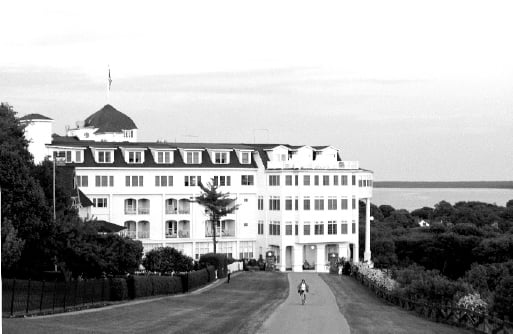The scents of lilacs, fudge, and horse manure mingle to form the distinctive aroma of Mackinac Island in early June. The tourist season is not yet in full swing; it starts in earnest with the Lilac Festival, the first day of which will be our final day on the island. A mild winter and an early spring encouraged the lilacs to bloom early; two days before the festival opens, they are already slightly past their peak. The scent of the fudge will peak about the time the scent of the horses does, in the hottest days of July and August.
When the Grand Hotel first opened its doors on July 10, 1887, July and August were the entire season. During the summer, life in the cities, as Bob Tagatz, the resident historian, points out, was unbearable. It wasn’t simply the lack of air conditioning, or a dearth of lilacs and fudge shops to mask the scent of the horses, but the smoke and the heat from the foundries and factories, and, in such railroad hubs as Chicago, the stench of blood and guts from the slaughterhouses. The railroads had helped to make city life in the summer unpleasant, but they offered relief to those who could afford it. The Grand Hotel, constructed and owned by the railroads, quickly became the premier destination for the children of the Gilded Age. The sons and daughters of robber barons and rising Midwestern industrialists spent not two nights, but a full two months on Mackinac Island, the crown jewel of the Great Lakes.
The history of the Grand Hotel is fascinating, from its construction in 93 days through its years as a speakeasy during Prohibition, to 1951, the first year it ever turned a profit, down to today, as it enters its third generation as a family-owned business. A few days each week, Bob Tagatz regales guests with tales of the past 125 years on one end of the famous porch of the Grand Hotel, the world’s longest at 660 feet.
My wife and I are on Mackinac Island to celebrate our 20th wedding anniversary. We have been to the island a number of times—we spent two nights at the Chippewa Hotel, down on the harbor, on our honeymoon—but this is only our second stay at the Grand Hotel. As we had two years ago in September, when we were able to bring our entire family (“infants” 11 and under stay and eat free), we spent much of our three days on the island on the porch, enjoying the breeze and the conversation with each other and with our fellow guests. When the weather is perfect (as it was every day we were there) the view across the Straits of Mackinac is breathtaking; when the storms roll in and the seas rise, it is even more so, at least for a boy who grew up on the shore of Lake Michigan and who still thrills at the sight of giant ore boats making their way through the darkened straits, guided by the beacons of lighthouses that are more than romantic relics of a distant past.
The porch of the Grand Hotel has a civilizing effect on its guests. The occasional cellphone or iPad makes its appearance, but laptops are few and far between, and newspapers and books are more than decoration for the tables placed between the rockers. People who have built houses without porches will sit contentedly for hours, holding the kinds of conversations with strangers that their grandparents once held with their neighbors.
Bob Tagatz’s most amusing tales concern the activities that various social directors at the hotel dreamed up to keep their guests occupied, and the Grand still provides a full slate of activities. But many are looking for what Amy and I have come here to find—not exactly peace and quiet, because a hotel this size is always brimming with life (and there is always live music playing somewhere in the Grand), but an atmosphere that acknowledges, contrary to what even Christian authors tell us today, that life isn’t all about the journey: The destination matters, too.
Much of Europe shuts down for the entire month of August; this, some Americans remark with scorn, is what separates us from our European cousins. They are correct, but not in the way they think. With all of our “labor-saving” technology, we work more hours than ever before, and we fill up what little leisure is left with premeasured entertainment that keeps us constantly aware of the passage of time. When I was a boy, summer lasted forever; now, it is over in the blink of an eye. This is not simply a function of age; our three days at the Grand Hotel feel more like ten, and an entire summer season, back in the late 19th or early 20th centuries, must have seemed like a year in itself, to young and old alike.
But back in what Bob Tagatz calls “the United States of Generica,” time rushes on. And to what end? To work all year, and to pile up debt, to fill our lives with Chinese-made contraptions that soon will clutter landfills, and our bodies with fast food that will preserve us in our early graves. All of this seems self-evidently right to most Genericans today; yet to work all year to spend a month on Mackinac Island would be dismissed as the height of frivolity.
Such thoughts, however, belong to a different day. For now, on the porch, time slows to a crawl.



Leave a Reply